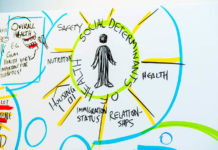How Therapists Can Grow Beyond Cultural Competence
From GoodTherapy.org: Cultural competence is the standard set by the mental health profession that deems therapists capable of providing services to clients from diverse backgrounds. However,...
How Midcentury Arab Thinkers Embraced the Ideas of Freud
In this piece for Aeon, Omnia El Shakry highlights the role that Freudian ideas and psychoanalysis played in midcentury Arab literature, education, politics, and culture.
"For some,...
Schema Therapy: Working With Complex Clinical Presentations
From The British Psychological Society: Dr. Susan Simpson provides an introduction to schema therapy and its uses in treating people who have been diagnosed with...
Few Counselors Are Trained to Treat Racial Trauma
From ThinkProgress: A new study found that the majority of counselors in the United States are not prepared to identify or treat race-based trauma, which...
How Can a Therapist Get the Most Out of Therapy?
In this piece for The Guardian, Susie Orbach describes the importance of therapists' own feelings and emotions in understanding and building relationships with their clients.
"Feelings are the...
Why I See a Black Queer Therapist
In this essay for them, Steven W. Thrasher describes how seeking treatment from a black queer therapist has helped him heal from the emotional distress and trauma...
Prescription Drug Addiction: Government Launches Investigation
From The Guardian: The British government has ordered an investigation into the growing problem of addiction to prescription drugs such as opioids, benzodiazepines, and antidepressants.
Article...
I Almost Got Hit by a Lightning Bolt
I am so thankful that my brain healed from the damage caused by psychiatric medications. Most importantly, finding my purpose in life and living an authentic life helped to ground me and prevent further psychosis. Psychosis is the psyche’s cry for transformation and healing. When one listens to the call, one is brought from darkness to light.
Why It’s Time to Let Psychoanalysis Into Politics
In this piece for Prospect, Susie Orbach explains how insights from psychoanalysis can help us understand our current political, social, and economic climate.
"Politically, socially, ecologically and economically,...
Trauma Resiliency Model: A New Somatic Therapy for Treating Trauma
Report presents new body-based therapeutic approach for shock and complex developmental trauma.
Anti-Freud: Karl Kraus’ Criticism of Psychoanalysis and Psychiatry
In this piece for Psychiatric Survivors, John C. Hancock discusses the work of Karl Kraus, who was praised by Thomas Szasz as one of the greatest...
Psychiatry is a Disaster Area in Healthcare That Needs Attention
In this piece for The BMJ, Dr. Peter Gøtzsche points out several of the major problems with the drug-based paradigm of psychiatric care as well as...
Study Investigates Factors that Foster Posttraumatic Growth in Prison
Emotional support, religion, and searching for meaning are positively correlated with posttraumatic growth among prisoners.
“I Was Afraid to Dismantle the Story About Depression”
In this interview for The Guardian, Johann Hari discusses his latest book, Lost Connections, which critiques bioreductionist models of depression and anxiety and emphasizes environmental influences...
Therapeutic Alliance: Implications for Practice and Policy
In this piece for Psychiatric Services, Dr. Sandra Steingard comments on the implications of a recent meta-analysis demonstrating the positive effects of the therapeutic alliance on pharmacologic...
The Medicalization of Conversation
Language, and how we use it, are important to counselling’s conversational work. As a counsellor, my language for understanding and addressing client concerns often fits poorly with the diagnostic and treatment language used to manage services within that system.
We Still Buy the Lie That Chemical Imbalances Cause Depression
From Quartz: Despite its inaccuracy, the chemical imbalance theory of mental illness continues to persist in public consciousness. The prevalence of this myth may be...
Interventions that Promote Disclosure Among Voice-Hearers
The perspectives of the voice-hearers featured in the research underscore that stigma and negative perceptions of voice hearing present significant obstacles within early intervention programs.
Social Recovery Therapy for First Episode Psychosis
Social Recovery Therapy shows promising results for individuals who experience first-episode psychosis.
Researchers Present Structural Competency Training Model for Psychiatrists
Researchers argue that a structural competency and social determinants of health approach must be made central to psychiatry training.
The Great Psychoanalysts 2: Melanie Klein
This piece for The Philosophers' Mail profiles Melanie Klein, a Viennese psychoanalyst best known for applying the principles of Freudian psychoanalysis to children. Klein's work primarily focused...
Researchers Push for Transparency of Mental Health Outcome Data
A new analysis of UK mental health data suggests the way organizations deliver mental health services can alter patient outcomes.
Speaking, Not Texting, May Prevent Dehumanization in Disagreements
Researchers found participants were less likely to dehumanize those with whom they disagreed when they heard their voices.
Bringing Trauma-Informed Care to Children in Need
From STAT: Numerous studies have confirmed that adverse childhood experiences are common and can lead to negative long-term health outcomes. Many pediatricians and hospitals are working...
Félix Guattari: Origins in Trotskyism and Psychoanalysis
In this piece for Non.copyriot.com, Andrew Ryder discusses the life and ideas of the psychotherapist, philosopher, and activist Félix Guattari, whose work united many of...

































